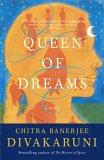Reading Guide Questions

Please be aware that this discussion guide will contain spoilers!
"A dream is a telegram from the hidden world." So writes the matriarch
of Chitra Banerjee Divakaruni's mesmerizing
Queen of Dreams. A novel that unites
mystical, unseen worlds with the all-too-real dilemmas of modern life, this is
the story of Rakhi's family–three generations with shared hopes and distinct
memories. Rakhi is a single mother living in Berkeley, California, where she
struggles to keep a teahouse in business while nurturing her career as an
artist. Her mother is a dreamteller, born with the ability to experience and
interpret the dreams of others. This double-edged gift allows her to preview
fate, but isolates her from her daughter and husband. It is only through a
painful, bewildering turn of events that Rakhi is at last able to know the truth
about her mother's life in India, and her family's destiny in America.
Woven with the evocative, elegant storytelling that has made Divakaruni such an
acclaimed literary treasure,
Queen of Dreams provides numerous topics for
further consideration. This is a tale from which you may be reluctant to awaken;
we hope this guide will enhance your enjoyment of it.
Reading Guide
- Compare Rakhi's parenting style to that of her mother's. To what do you
attribute these differences? What universal wisdom about mothers and daughters
does the novel convey?
- Discuss the role of the snake and its presence in the life of Rakhi's
mother. Does it provide enlightenment, or is it merely a messenger? Do you view
it as an ominous or wise presence in her life?
- What transformations occur in Rakhi after her mother's death? How do her
attitudes toward Sonny and her father change? What obstacles prevented her from
trusting them previously?
- How do you perceive Jona's visionary gifts? As a twenty-first century
Californian, will she experience dreamtelling benefits not afforded to her
grandmother, or do you predict that Jona's intuitive legacy will be diminished
by contemporary Western culture?
- Chapter 21 describes the process by which Mrs. Gupta was trained in her
arts, and the many sacrifices (emotional as well as material) presented by life
as a dreamteller. What analogies does her experience offer about the nature of
all vocational choices? Does the modern world encourage us to discern and
nurture our true talents?
- Chitra Banerjee Divakaruni presents a variety of points of view in Queen
of Dreams. How does Rakhi's storytelling voice compare to the one presented in
her mother's journals? What is the effect of occasional chapters in third-person
narration?
- What is meant by being a "queen of dreams?" What are the duties
and powers of this position? Who are her subjects? How would you characterize
her kingdom?
- Consider the lessons presented in chapter 11. What results do you derive
from applying them to your own dreams? What is your personal understanding of
the purpose and origin of dreams, especially in response to the portions of
Samyukta's speech recalled in the closing paragraphs of chapter 27? How do the
various otherworldly images presented in the novel illustrate the essence of the
primary characters?
- How did your perception of Rakhi change throughout the book? Did you
initially see her as a pessimist or a realist, or neither?
- In what way do Jespal and Belle serve as a backdrop for the paradoxes of
love and companionship presented elsewhere in the novel?
- Do the questions presented at the end of chapter 18 parallel your
approach to literature in any way?
- Discuss the novel's portrayal of 9/11 and the impact of terrorism on
Rakhi's community. What microcosm of America is embodied in Kurma House
International? What safe havens or coping strategies did you seek during the
autumn of 2001?
- What is your understanding of the mysterious black car and Rakhi's silent
patron? What is the significance of her asana lesson?
- The childhood memories of Rakhi's father indicate the true depth of his
unrealized talent, at last brought to life when he joins her business. What was
the impetus for his decision to cook once again, despite his pragmatic persona?
What do you make of his desire to establish an honor system for payment, and the
belief that gratitude does not need to be articulated? Do you believe that on
some level he was able to "banish" Rakhi's ominous competitor?
- Consider the second definition of dreams–those related not to sleep,
but to aspiration. What hopes and wishes are presented in Queen of Dreams? What
ultimately determined whether those dreams came to fruition?
- Reread the first chapter again, exploring it in the context of the
novel's ending. How does Mrs. Gupta approach her own death? Would you be able to
receive such predictions as calmly? What enabled Rakhi to at last experience
bliss, even in the wake of tragedy?
- Are premonitions beneficial?
Unless otherwise stated, this discussion guide is reprinted with the permission of Anchor Books.
Any page references refer to a USA edition of the book, usually the trade paperback version, and may vary in other editions.

 Book Reviewed by:
Book Reviewed by:


